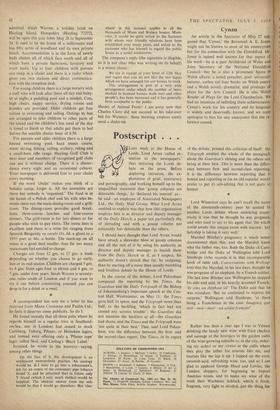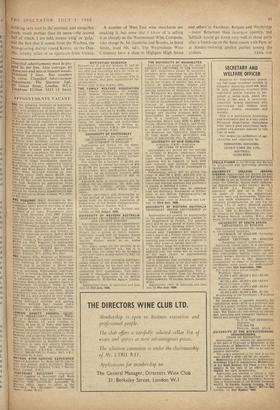Postscript . .
LAST week in the. House of Lords, Lord Arran 'called at- tention to the ■newspapers,' thus initiating the Lords de- bate on the press. Before deploring intrusion, the ex- ploitation of grief, inaccuracy and pornography, and working himself up to the unqualified statement that 'gossip columns are detestable things,' he 'declared his interest' as— he said—an employee of Associated Newspapers Ltd., the Daily Mail Group. What Lord Arran omitted to explain was that how this organisation employs him is as director and deputy manager of the Daily Sketch, a paper not particularly shy of intruding and with a gossip column not noticeably less detestable than the others.
I should have thought that Lord Arran would have struck a shrewder blow at gossip columns and all the rest of it by using his authority as director and deputy manager to banish them from the Daily Sketch or if, as I suspect, his authority doesn't stretch that far, by resigning, than by starting off a more than usually bumbling and fruitless debate in the House of Lords.
In the course of the debate, Lord Pakenham compared the reporting by the Times, the Guardian and the Daily Telegraph of the Bishop of Johannesburg's important speech at the Cen- tral Hall, Westminster, on May 11 : the Times gave half its space, and the Telegraph more than half, to the heckling, 'which in fact had not caused any serious trouble' : the Guardian did not mention the hecklers at all—the Guardian had shone, and the Times and the Telegraph were `not quite at their best.' That, said Lord Paken- ham, was the difference between the first- and the second-class report. The Times, in its report of the debate, printed this criticism of itself the Telegraph omitted the whole of the paragraph about the Guardian's shining and the others not being at their best. This is more than the differ- ence between first- and second-class reporting, it is the difference between reporting that is honest and reporting or (as an old reporter would prefer to put it) sub-editing that is not quite so honest.
Lord Winterton says he can't recall the name of the nineteenth-century peer he quoted in another Lords debate whose endearing eccen-, tricity it was that he thought he .was pregnant, and who used to say to his agent that 'the whole world awaits this unique event with interest : her ladyship is taking it very well.'
Marshal Blucher's pregnancy is much better documented than this, and the Marshal knew who the father was, too. Both the Duke of Cam- bridge and the Duke of Wellington told Lord Stanhope (who records it in that incomparable book of table talk, Conversations with Welling- ton) that the Marshal, in his last days, thought he was pregnant of an elephant; by a French soldier. The last time Bliicher saw Wellington he slapped his side and said, in his heavily accented French, `Je sens un elephant la!' The Duke said that he was mistaken. 'But he continued to express his surprise,' Wellington told Stanhope, 'at there being a Frenchman in the case. Imaginez que mot—moi—inoll—un soldat !ample
*
Rather less than a year ago I was in Vienna drinking the heady new wine with fried chicken and sausage at the heurigen in the garden cafés of the wine-growing suburbs or, in the city, order- ing my achtel or my viertel at the cafés where they play the zither for tourists like me, and tourists like me lap it up. I lapped .up the cool, sweetish-acid, refreshing wine, too, and so I am glad to applaud George Head and Lawler, the London shippers, for beginning to import Austrian wines, and to make my wine of the week their Wachauer Schluck, which is fresh, fragrant, very light in alcohol, just the thing for drinking very cool in the summer, and altogether much, much prettier than its name—the second half of which, I am told, means 'swig' or 'gulp,' and the first that it comes from the Wachau, the Wille-groWing district round Krems, on the Dan- ube. seventy miles or so upstream from Vienna.
A number of West End wine merchants are stocking it, but none that I know of is selling it as cheaply as the Westminster Wine Company, who charge 9s. 3d. ustcrini and Brooks, in Bond Street, want 10s. 6d ). The Westminster Wine Company have a shop in Highgate High Street
and others at Farnham, Reigate and Weybridge --- more Betjeman than hourigen country, but Salmi( would go down eery well in those parts after a knock-up on the hard courts with Pam. or at Sunday-morning Barden parties among the



























































 Previous page
Previous page